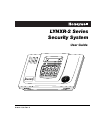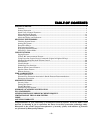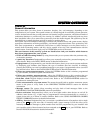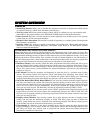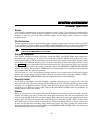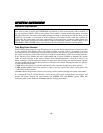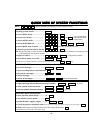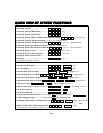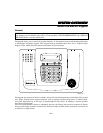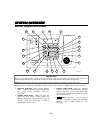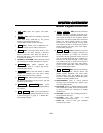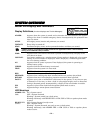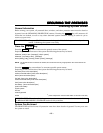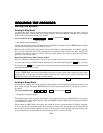
– 6 –
SYSTEM OVERVIEW
SYSTEM OVERVIEWSYSTEM OVERVIEW
SYSTEM OVERVIEW
Features
• Scheduling feature: Allows you to schedule the automatic activation or deactivation of X10 devices
or program events (e.g. alarm clock, reminder, and latch key).
• Two-way voice: Allows the central station to listen, talk to or conduct two-way conversations with
individuals on the premises Refer to the TWO-WAY VOICE section for detailed information.
• Phone Control: Provides a remote interactive phone capability that permits access to the security
system from any off-site touch-tone telephone.
• Speaker Phone Operation: The system is capable of operating as a speaker phone allowing hands
free telephone conversation.
• Security Codes: The system is capable of supporting an Installer code, Master user code and six
additional User codes including Babysitter and Duress codes. Refer to the SECURITY CODES
section for detailed information.
LYNXR-2SIA False Alarm Prevention Features
Many false alarms are caused by simple accidents, like forgetting to close a door when you leave. The
LYNXR-2SIA includes several features that help prevent false alarms and some of these are optional or
programmable. Although turning off some of these features may provide additional security, it may also
increase the chance of false alarms. Your installer can help you decide whether to use the features or
not. The following provides a brief explanation of the features included with your security system that
help prevent false alarms from occurring, and what you should do if such alarms occur.
• Exit/Entry Delays: Your security system has been programmed with delay times that allow you to
exit the premises after arming, and to disarm the system upon entry, before an alarm occurs. If you
leave the premises too late when exiting, or disarm too late when arriving home, it will cause a false
alarm. If an alarm occurs, you should disarm the system immediately, and wait for your monitoring
company to call you.
• Exit Alarms: Leaving the premises and forgetting to close the door is a common cause of false
alarms. The security system will sound an alarm, and display EA, indicating, “exit alarm”. The
security system provides extra time for you to disarm the system before dialing your monitoring
company. Disarming the system immediately may prevent a call to your monitoring company.
• Exit Time Restart-Exit Delay Restart/Reset: If you leave the premises and enter again before the
exit delay has expired, the system will restart the exit time giving you more time to leave. If there
are less than 10 seconds left to exit, the system will sound fast beeps, indicating an alarm will occur
soon if you fail to exit or disarm immediately. If this occurs, disarm the system and arm it again
when you are ready to leave. The Exit Delay can also be restarted by entering CODE + STAY.
• Auto Stay Feature: If you arm the system in the “AWAY” mode from the control’s keypad or an RF
keypad but no one exits, the alarm system will automatically change to the “STAY” mode. This will
prevent you from tripping alarms by remaining on premises. Disarm the system and arm away again
when you are ready to leave.
• Burglary Abort Window: Your security system has a delay between the time a burglary alarm
sounds, and the time the monitoring company is called. This delay gives you time to disarm the
security system before the alarm is reported to the monitoring company. This delay is factory preset
at 30 seconds, but may be increased or decreased by your installer.
• False Alarms: If a burglary or fire alarm condition occurs and the system has been disarmed, the
keypad will display “CA” or cancel. If this was a false alarm, wait for the monitoring company to call
you. They will verify your security code or password and prevent them from calling emergency
personnel to respond to a false alarm.



